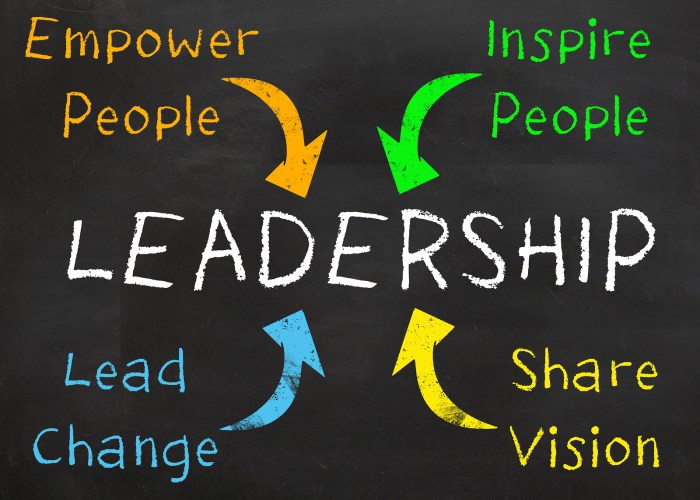Leadership Development sets the stage for cultivating effective leaders in organizations, exploring strategies, key skills, and challenges in a dynamic and insightful manner.
From understanding the importance of leadership development to navigating through key skills and challenges, this guide delves into the core aspects of nurturing strong leaders.
Importance of Leadership Development
Leadership development plays a crucial role in organizations as it helps in nurturing future leaders, enhancing employee engagement, and driving overall company success. Investing in leadership development programs can have a significant impact on the performance and growth of a company.
Enhanced Employee Performance
Effective leadership development programs can lead to improved employee performance by providing necessary skills and tools to leaders. When employees are led by competent and skilled leaders, they are more motivated, engaged, and productive, ultimately contributing to the success of the organization.
Succession Planning
Leadership development programs also aid in succession planning by identifying and grooming potential leaders within the organization. This ensures a smooth transition of leadership roles and continuity in business operations, reducing the risk of disruptions and maintaining stability.
Organizational Growth
Investing in leadership development can drive organizational growth by fostering innovation, creativity, and adaptability. Strong leaders can navigate challenges, inspire teams, and steer the company towards achieving its goals and objectives effectively.
Strategies for Effective Leadership Development

When it comes to developing strong leaders, there are various strategies that organizations can implement to ensure success. From traditional methods to modern approaches, each strategy plays a crucial role in shaping the future of leadership within a company. By understanding the differences between these strategies and knowing how to design a successful leadership development program, organizations can cultivate a culture of effective leadership.
Traditional Leadership Development Methods vs. Modern Approaches
- Traditional methods often focus on classroom-based training sessions, mentoring programs, and job rotations to develop leadership skills over time.
- Modern approaches, on the other hand, leverage technology such as online courses, virtual coaching, and gamified learning experiences to engage and develop leaders in a more dynamic and interactive way.
- While traditional methods provide a solid foundation for leadership development, modern approaches offer flexibility, personalization, and real-time feedback to enhance the learning experience.
Steps to Design a Successful Leadership Development Program
- Identify key leadership competencies: Define the specific skills and qualities that leaders need to succeed within your organization.
- Align with organizational goals: Ensure that your leadership development program is aligned with the overall strategic objectives of the company.
- Utilize a variety of learning methods: Incorporate a mix of training methods, such as workshops, simulations, and on-the-job experiences, to cater to different learning styles.
- Provide continuous support and feedback: Offer ongoing support, coaching, and feedback to help leaders grow and improve their skills over time.
- Evaluate and adjust: Regularly assess the effectiveness of your leadership development program and make adjustments as needed to ensure continued success.
Key Skills for Leadership Development

Effective leadership requires a combination of essential skills that help leaders navigate challenges, inspire teams, and drive success. Developing these key skills is crucial for anyone looking to excel as a leader.
Emotional Intelligence
Emotional intelligence plays a vital role in leadership development as it enables leaders to understand and manage their emotions effectively. Leaders with high emotional intelligence can empathize with others, resolve conflicts, and make well-informed decisions. By recognizing and regulating their emotions, leaders can build stronger relationships with their team members and create a positive work environment.
Communication Skills
Communication skills are essential for effective leadership development as they allow leaders to convey their vision, goals, and expectations clearly to their team. Strong communication skills enable leaders to inspire, motivate, and influence others. By actively listening, providing feedback, and fostering open dialogue, leaders can build trust, alignment, and collaboration within their team. Effective communication is key to resolving conflicts, addressing challenges, and achieving shared objectives.
Challenges in Leadership Development
In the realm of leadership development, organizations often face various challenges that can hinder the successful implementation of programs aimed at nurturing future leaders. These challenges can range from resistance to change to the influence of organizational culture on leadership development initiatives.
Resistance to Leadership Development Programs
One common challenge faced by organizations is the resistance from individuals within the company who may be comfortable with the status quo. Some employees may feel threatened by the idea of leadership development, fearing that it could disrupt existing power dynamics or lead to increased competition within the organization.
- Implement clear communication strategies to explain the purpose and benefits of leadership development programs to all stakeholders.
- Involve employees in the planning and decision-making process to increase buy-in and support for the initiatives.
- Showcase success stories of individuals who have benefited from leadership development to inspire others to participate.
Impact of Organizational Culture
Organizational culture plays a significant role in shaping the success of leadership development efforts. A culture that does not prioritize or support leadership development can pose a major obstacle to the growth and development of future leaders within the organization.
- Conduct a thorough assessment of the existing organizational culture to identify any barriers to leadership development.
- Integrate leadership development initiatives into the core values and beliefs of the organization to ensure alignment with the overall culture.
- Provide training and resources to leaders at all levels to help them foster a culture that promotes continuous learning and growth.
